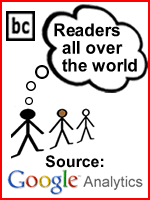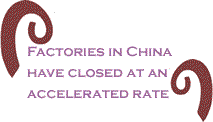The
fear mongering in the highest circles of American government
continues apace, as was demonstrated in all of the hoopla
surrounding the State of the Union speech delivered by President
Obama last week and criticized by Republicans of every stripe.
 Obama�s
code word for spending is �investment,� according to the
GOP leadership and the Tea Partiers on their far right flank.
And, what we have to be very concerned about is America�s �lack of
competitiveness.� It seems, in the view of those on the
right, that we�re being outdone in education (math and science,
especially) and in other areas by nations around the world. Obama�s
code word for spending is �investment,� according to the
GOP leadership and the Tea Partiers on their far right flank.
And, what we have to be very concerned about is America�s �lack of
competitiveness.� It seems, in the view of those on the
right, that we�re being outdone in education (math and science,
especially) and in other areas by nations around the world.
What
is especially disconcerting for those who control the U.S.
economy is China.
We are not, they claim, meeting the challenge presented
by the People�s Republic, either in terms of economic growth,
the education of our children, or in their growing dominance
in the global marketplace.
While
it is true that China�s economy is growing at a pace three
or four times that of the U.S., there are other elements
of a successful society that must be considered and, when
those things are considered, it becomes clear that
China is not the monster in the dark it is being made out
to be.
It�s
just that we need someone or something to concentrate on
and someone to blame when things fall apart. Both government
leaders and those in charge of Corporate America have made
China
out to be the adversary, if not the enemy, just as Japan was in the early 1990s in the time of George
H.W. Bush and Bill Clinton.
Although
a small country with limited natural resources, Japan
was a powerhouse, especially in the global automotive industry.
Americans were told that the island nation would take over
production and sales of not just the auto industry, but
others, as well. If U.S. economists and the pundits and politicians
knew that the economic tidal wave could not last, they weren�t
sharing it with the American people. Japan still struggles economically.
Politicians
and Corporate America today are not leveling with the people
in the case of China. In many ways, in spite of their amazing
economic growth and the amount of our debt that they own,
they are in tough shape. For example, they have emptied
much of the rural areas for cheap labor in the factories
that have been supplying consumer goods for the U.S. and Europe for years.
 The
downturn in the world�s economy has affected the Chinese
workers. As Americans and others stopped buying as much
consumer goods, factories in China have closed at an accelerated rate. They
have sent the workers back to the hinterlands where there
are few jobs that would provide a living, not that the factory
jobs provided a living wage. The
downturn in the world�s economy has affected the Chinese
workers. As Americans and others stopped buying as much
consumer goods, factories in China have closed at an accelerated rate. They
have sent the workers back to the hinterlands where there
are few jobs that would provide a living, not that the factory
jobs provided a living wage.
China�s system of farming has changed from its millennia-old
labor-intensive ways to a more �western� system of power,
chemicals, and petroleum products. The change started under
Mao Zedong about 40 years ago and the nation�s agriculture
has progressed to the point at which it is one of the nations
that has enough money to buy up land in developing nations.
In those developing nations, food will be grown for export
back to China, not to feed the people of the developing
nations, including several in Africa and South
America. Other countries are doing the same, including Saudi Arabia, but the effect is the same. Local
labor will be growing food for foreign countries, but they
won�t be eating it.
Add
to that the environmental degradation that China
is suffering. What does it say about a nation�s health,
when people in the streets are wearing surgical masks just
to keep the larger particulates out of the air they are
breathing? How bad can it be that China
had to shut down all of the industries for several weeks
in the vicinity of the games when the Olympics were held
in Beijing a few
years ago, just so the athletes could breathe while competing?
China is adding new coal-fired electric generation plants
at a dizzying pace in its attempt to keep up with the power
demand for its industries and factories, but coal arguably
is the most polluting of the methods of power production.
It will make working conditions more risky and the health
of workers even more precarious.

The
disparity between the rich and poor in China
probably dwarfs that of the U.S.,
which is the worst since the Robber Barons of a century
ago. Within the past year, the average wage of a Chinese
worker was 55 cents per hour and some of the workers, including
children, are paid as little as 20 cents or 30 cents an
hour. While it�s true that there are many millionaires in
China and the numbers are growing every year, the vast majority
toils for starvation wages, even by Chinese standards.
Can
China and the U.S. �compete,� as we approach a time when cheap
fossil fuel will no longer exist? That�s the real thing
against which both the U.S.
and China have to compete.
The �competitiveness� between and among nations for the
remaining supplies of fossil fuels is a sure plan for disaster,
for no one is planning for the time when it is gone. At
least, in the short term, there should be plans in the works
for a short supply.
Neither
apparently is forthcoming from leaders in the U.S.
or China.
All they can think about is increasing the rate of economic
growth, ignoring the economic, social, and physical health
of their citizenry.
While
Obama spoke in his State of the Union address about pure
or basic research, education, and improving the nation�s
�infrastructure,� he neglected to mention his predecessors
who emptied the land of manufacturing and heavy industry.
We know those jobs are not going to return, because workers
in other countries are willing to produce those things at
one-quarter or one-fifth of the labor cost needed by American
workers to survive in the modern economy.
 High
wages and good benefits and the unions it took to get them
were the bedrock that made America a powerful
nation. The living standard that resulted will be hard to
replicate, since it took 50 years to achieve it and it took
less than 30 years to bring it down, starting with the �Reagan
Revolution,� which began the all-out assault on trade unions
(and workers) and introduced �trickle-down economics,� which
can be described most politely as �feeding the horses so
the sparrows can eat.� High
wages and good benefits and the unions it took to get them
were the bedrock that made America a powerful
nation. The living standard that resulted will be hard to
replicate, since it took 50 years to achieve it and it took
less than 30 years to bring it down, starting with the �Reagan
Revolution,� which began the all-out assault on trade unions
(and workers) and introduced �trickle-down economics,� which
can be described most politely as �feeding the horses so
the sparrows can eat.�
There
are too many of us not eating so well these days and the
prospect for more of the same is unfortunately pretty good,
if we�re to believe non-profit anti-hunger organizations,
religious institutions, and even the U.S. Department of
Agriculture and their predictions for the near future. And
that�s just the eating part of living our lives. There are
other things like health care (non-existent for 50 million),
housing (substandard, with millions whose homes have been
lost to foreclosure), and lack of public transportation
(much more efficient than cars in a time of high oil prices).
But
the high official unemployment rate of nearly 10 percent
and a real rate approaching 20 percent (those who can�t
find a job after years of looking) is not something that
either major party wants to address. Even the skeletal structure
of manufacturing and heavy industry of America�s past does not exist, so it is difficult
to envision a resurgence of those kinds of jobs.
If
we wait for the development of �green� jobs and whole new
industries, it is likely to be many years in the making,
because the GOP and its right wing, along with Corporate
America are not interested in such things and they are downright
hostile to any suggestion that America help the people who
are left without jobs or any means of support. Their mantra:
no welfare, no extended unemployment benefits, no health
care, no pensions, no Social Security, no Medicare or Medicaid,
and no government work.  With
leadership like that, it�s no wonder that American workers
and workers around the globe are closely watching what has
happened, and is happening, in Tunisia, Egypt, Yemen, and
other places where the few rule the vast multitude. With
leadership like that, it�s no wonder that American workers
and workers around the globe are closely watching what has
happened, and is happening, in Tunisia, Egypt, Yemen, and
other places where the few rule the vast multitude.
Workers
everywhere are beginning to see that workers in other countries
are not the enemy, nor even the adversary. Rather, it is
the people who run those countries and their economies.
At the very least, U.S.
politicians must level with the people and stop trying to
tell us that the enemy is those who are struggling just
like we are.
BlackCommentator.com
Columnist, John Funiciello, is a labor organizer and former
union organizer. His union work started when he became a
local president of The Newspaper Guild in the early 1970s.
He was a reporter for 14 years for newspapers in New York State. In
addition to labor work, he is organizing family farmers
as they struggle to stay on the land under enormous pressure
from factory food producers and land developers. Click here
to contact Mr. Funiciello.

|

